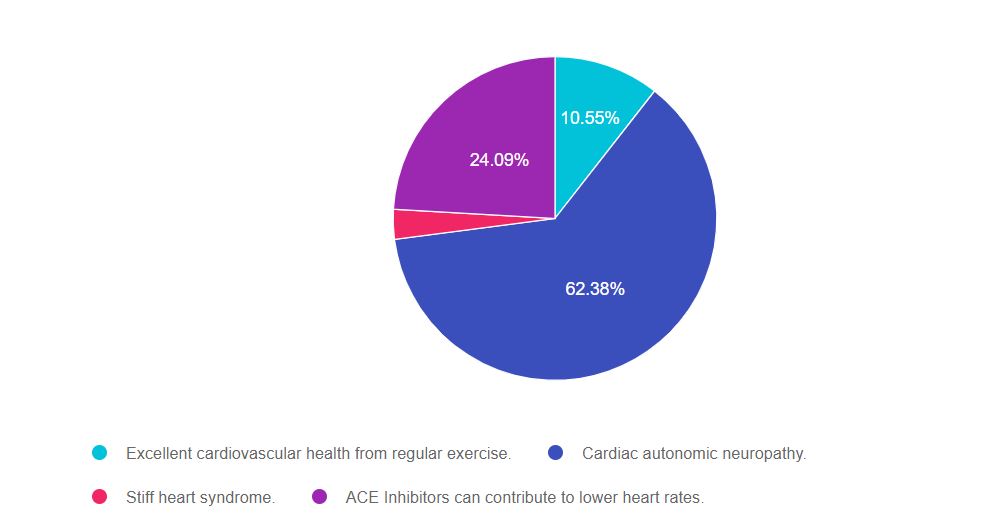
For our April 13th Question of the Week, 62% of respondents chose the best answer. We wanted to “take a closer look” into this question.
Before we start though, if you don’t want any spoilers and haven’t tried the question yet, you can answer below: Answer Question
Question: LR loves going to the gym 3 times a week. LR is 78, with Latent Autoimmune Diabetes (LADA) and is on basal bolus insulin. LR also takes a statin and ACE Inhibitor. LR has a history of retinopathy and peripheral neuropathy. During your assessment, LR proudly shares that when on the treadmill, their heart rate never goes above 100 beats per minute.
What best explains this heart rate?
Answer Choices:
- Excellent cardiovascular health from regular exercise
- Cardiac autonomic neuropathy
- Stiff heart syndrome
- ACE Inhibitors can contribute to lower heart rates

As shown above, the most common choice was option 2, the second most common answer was option 4, then option 1, and finally option 3.
Getting to the Best Answer
If you are thinking about taking the certification exam, the content of this practice test question will set you up for success. The exam will present questions that require test takers to make sure the answer matches the ADA Standards of Care and best clinical practice.
Answers & Rationale
Answer 1 is incorrect, 10.55% chose this answer, “Excellent cardiovascular health from regular exercise .” On first blush, this answer is tempting, yet it doesn’t consider in all the factors described in the case study. If we look at his age and the presence of microvascular disease and neuropathy, we are correct to suspect that he may also have autonomic neuropathy. Therefore, his low heart rate isn’t an indication of robust health but a sign of autonomic dysfunction.
Answer 2 is correct, 62.38% of you chose this answer, “Cardiac autonomic neuropathy.” Good job! When we look at his age and the presence of microvascular disease and neuropathy, we are right to suspect he also has cardiac autonomic neuropathy. As a result of nerve disease, his heart rate isn’t able to respond to the cardiac demand of intense exercise and never exceeds 100. This “fixed heart rate” is a sign of autonomic dysfunction that warrants further investigation.
Answer 3 is incorrect, 2.98% of you chose this answer, “Stiff heart syndrome.” People with diabetes are more likely to have stiff fibrotic hearts and this can lead to increased risk of heart failure. However, there is no such condition as a “stiff heart syndrome”. This answer was a distractor.
Answer 4 is incorrect, 24.09% of you chose this answer, “ACE Inhibitors can contribute to lower heart rates.” This was our juicy answer. The blood pressure class of ACE Inhibitors does not lower heart rates but does lower blood pressure. The blood pressure class Beta Blockers, can lower heart rate, but it was not included in this question. See our Med Cheat Sheets 2021 | Hypertension, Lipids, and Neuropathy for more info.
We hope you appreciate this week’s rationale! Thank you so much for taking the time to answer our Question of the Week and participate in this fun learning activity!
Want to learn more?
Join us for our Level 2 – Critical Assessment – Fine-Tuning your Diabetes Detective Skills – 2.0 CEs.

Diabetes Education Services Online University Courses are an excellent way to study for your exam anytime and anywhere that is convenient for you. You will have immediate access to your courses for 1 year after your purchase date. Each individual online course includes a: 90-minute video presentation, podcast, practice test, and additional resources.
This course integrates the ADA Standard of Care on elements of a comprehensive medical assessment (Standard 4) of the individual living with prediabetes, diabetes, or hyperglycemia. Through case studies and real-life situations, we discover often hidden causes of hyperglycemia and other complications, such as liver disease, sleep apnea, pancreatitis, autoimmune diseases, fractures, and more. We delve into therapy for complicated situations and discuss management strategies for other conditions associated with hyperglycemia such as Cystic Fibrosis, and Transplants. Join us for this unique and interesting approach to assessing and evaluating the hidden complications of diabetes.
Topics Include:
- Identify common yet often underdiagnosed complications associated with type 1 and type 2 diabetes.
- State strategies to identify previously undiscovered diabetes complications during assessments.
- Discuss links between hyperglycemia and other conditions including, transplant, cystic fibrosis and liver disease.
Intended Audience: A great course for healthcare professionals who want to learn the steps involved in providing a thorough lower extremity assessment.
Instructor: Beverly Thomassian RN, MPH, CDCES, BC-ADM is a working educator and a nationally recognized diabetes expert.
Can’t join live? No worries, we will record the webinar and post it to the Online University!
Sign up for Diabetes Blog Bytes – we post one daily Blog Byte from Monday to Friday. And of course, Tuesday is our Question of the Week. It’s Informative and FREE! Sign up below!
[yikes-mailchimp form=”1″]Accreditation: Diabetes Education Services is an approved provider by the California Board of Registered Nursing, Provider 12640, and Commission on Dietetic Registration (CDR), Provider DI002. Since these programs are approved by the CDR it satisfies the CE requirements for the CDCES regardless of your profession.*
The use of DES products does not guarantee the successful passage of the CDCES exam. CBDCE does not endorse any preparatory or review materials for the CDCES exam, except for those published by CBDCE.








